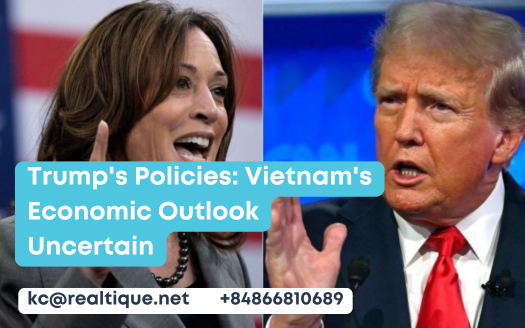Trump’s Policies: Vietnam’s Economic Outlook Uncertain
The implications of Trump’s policies are proving to be a double-edged sword for Vietnam’s economic environment, particularly in light of the potential for his re-election. While the nation has enjoyed impressive export growth, the specter of sustained tariffs poses a significant risk to its GDP, potentially dampening its competitive advantage. Yet, the shifting forces of global trade may offer unexpected opportunities, especially as companies seek alternatives to Chinese manufacturing. As Vietnam maneuvers through this complex landscape, the question remains: how will it adapt to an unpredictable economic future shaped by external forces?
Table of Contents
Impact of Policies on Vietnam
Assessing the impact of U.S. policies on Vietnam’s economy reveals a field of resilience amid global uncertainties.
Experts, including Michael Kokalari of VinaCapital and Nguyen The Minh from Yuanta, suggest that the economic ramifications of either Trump or Harris’s policies will be minimal for Vietnam.
Both candidates exhibit a commitment to economic growth, albeit with differing strategies, such as Harris’s focus on tax relief for families and small businesses.
Nevertheless, despite potential shifts in U.S. trade policies, Vietnam’s economic fundamentals remain sturdy.
The country is likely to continue leveraging its position as an alternative manufacturing hub, enhanced by strong demand in the U.S. market.
Trade Relations With the U.S
Amidst changing global trade patterns, Vietnam’s trade relations with the United States have significantly strengthened in recent years.
This growth can be attributed to several key factors:
Increased Exports: Vietnam’s exports to the U.S. surged by 24% in the first seven months of 2024, reaching nearly $33 billion by Q3, marking the highest value to date.
Supply Chain Shifts: The trade war initiated by Trump in 2018 prompted many companies to relocate their operations from China to Vietnam, enhancing bilateral trade.
Market Dependence: Nearly 30% of Vietnam’s exports are directed to the U.S., underscoring the importance of this relationship in supporting Vietnam’s economic stability.
As these changes evolve, Vietnam’s trade relations with the U.S. will remain essential for its economic prospects.
Economic Growth Predictions
Economic growth predictions for Vietnam are closely tied to the outcomes of the upcoming U.S. elections, with experts indicating that external factors, particularly trade policies, may play a vital part. Analysts caution that a re-election of President Trump could lead to a slowdown in Vietnam’s GDP, with estimates suggesting a decline of at least 1% for some Asian economies.
The International Monetary Fund (IMF) has also highlighted global growth risks associated with rising import tariffs.
Nevertheless, Vietnam’s economy may demonstrate resilience, enhanced by strong demand in the U.S. market, which supports a vigorous export sector. As a result, while uncertainties loom, the potential for continued economic growth remains, contingent on the unfolding geopolitical environment.
Tariffs and Competitiveness
The potential influence of tariffs on Vietnam’s economic competitiveness is becoming increasingly significant in light of the current trade environment.
As the U.S. considers higher tariffs, Vietnam stands to benefit in several ways:
Increased Manufacturing: A shift in supply chains may drive companies to relocate production from higher-tariff countries, enhancing Vietnam’s manufacturing capabilities.
Export Growth: With U.S. tariffs on Chinese goods, Vietnamese exports could rise substantially, strengthening the economy.
Competitive Advantage: Vietnam may gain a competitive edge as businesses seek to avoid tariffs, positioning the country as a favorable alternative for U.S. imports.
These factors suggest a potentially groundbreaking effect on Vietnam’s role in global trade, contingent upon the changing tariff environment.
Market Reactions to Election Outcomes
As investors brace for the upcoming election, the potential market reactions to the outcomes could significantly shape Vietnam’s financial environment. Analysts anticipate varied responses based on the election’s result, influencing investor sentiment and market stability. While Trump’s aggressive policies may incite volatility, a continuation of Biden’s approach could lead to more predictable fluctuations.
| Outcome | Potential Market Reaction | Impact on Vietnam’s Economy |
|---|---|---|
| Trump Wins | Increased volatility | Possible GDP slowdown |
| Biden Wins | Moderate fluctuations | Continued export demand |
| Harris Wins | Limited volatility | Stable trade relations |
| Status Quo | Minimal impact | Resilient economic growth |
| Uncertainty | High volatility | Cautious investor sentiment |
Investors will closely monitor these changes as they unfold.





